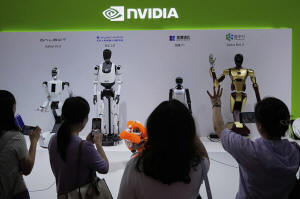China pledges to crack down on illicit exports of rare earths, urges US
to lift more trade controls
[July 19, 2025] By
ELAINE KURTENBACH
BANGKOK (AP) — China's state security agency says it is cracking down on
alleged smuggling of rare earths minerals that it says threaten national
security, just weeks after Beijing and Washington agreed to make it
easier for American firms to obtain from China those materials, which
are critical for manufacturing and computer chip production.
In a report published Friday in the state-run newspaper Global Times,
the Ministry of State Security said foreign “espionage and intelligence
agencies” were colluding to steal rare earths-related goods by
repackaging and relabeling rare metals to hide their Chinese origin.
In some cases the minerals were falsely declared as non-controlled
items, mislabeled as such things as “solder paste,” mixed into other
materials like ceramic tiles, or hidden in plastic mannequins or bottled
water, it said.
It referred only to an unnamed “certain country” that it said lacked the
capacity to make and refine its own rare earths.
Investigations had found Chinese criminals were involved, exploiting
shipping and delivery channels to evade controls on exports of the
materials used in many high-tech applications including electric vehicle
batteries, it said.
The crackdown followed a report by Reuters earlier this month detailing
how rare earths were being transshipped to the U.S. via Thailand and
Mexico.

China is the main source for many strategically vital rare earths and it
has moved to slow exports of such minerals in retaliation for steep
import duties President Donald Trump has imposed on Chinese goods since
he returned to the White House and launched his crusade to overturn a
global trading system he says is unfair to the United States and its
workers.
That followed an earlier series of restrictions by Beijing on exports of
such materials as gallium, germanium, antimony and tungsten in response
to trade friction with the administration of then-President Joe Biden.
In April, Beijing imposed permitting requirements on seven rare earth
elements, under a Chinese law that applies to all exports, not just
those bound for the U.S. market.
With the permitting process taking 45 days, the new requirement caused a
pause in shipments, threatening to disrupt production of cars, robots,
wind turbines and other high-tech products in the U.S. and around the
world. The U.S., meanwhile, added to restrictions on exports of advanced
technologies to China.
[to top of second column] |

Visitors give commands to a robot at Nvidia's booth during the 3rd
China International Supply Chain Expo at the China International
Exhibition Center, in Beijing, China, Friday, July 18, 2025. (AP
Photo/Mahesh Kumar A.)
 Rare earths have remained at the
center of China-U.S. talks aimed at staving off huge tariff
increases that were postponed in May to allow time for negotiations
on a broader trade agreement. The deadline for reaching a deal is
Aug. 12.
An agreement announced in late June did not remove China’s
permitting requirement on rare earths, but Beijing agreed to
flexibility in dialing up or down the approval process as needed.
Computer chips are another key bone of contention.
The Chinese Commerce Ministry said Friday that it had taken note of
a decision by the Trump administration to lift restrictions on
exports of key semiconductors used in artificial intelligence made
by Nvidia and its rival Advanced Micro Devices.
In April, the Trump administration announced it would restrict sales
of Nvidia’s H20 chips to China — as well as MI308 chips from AMD.
But Commerce Ministry spokesman Wang Wentao said restoring healthy
trade ties will require more action by Washington.
U.S. export controls on Ascend chips made by Chinese tech giant
Huawei Technologies have hurt the interests of Chinese companies,
Wang told reporters in Beijing.
“We hope that the United States and China will meet each other
halfway and correct their wrong practices through equal
consultation, create a good environment for mutually beneficial
cooperation between enterprises of both sides, and jointly maintain
the stability of the global semiconductor production and supply
chain,” he said.
All contents © copyright 2025 Associated Press. All rights reserved
 |